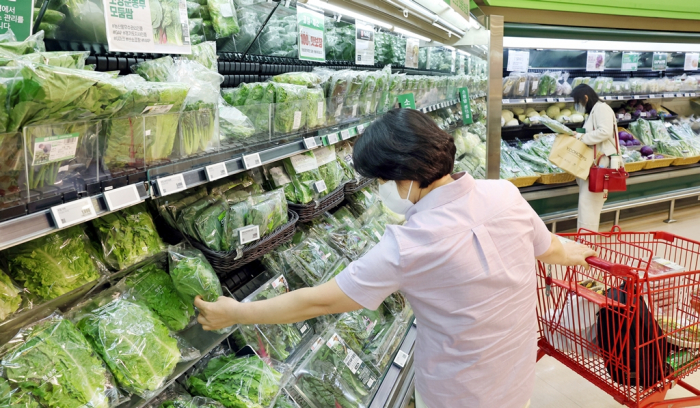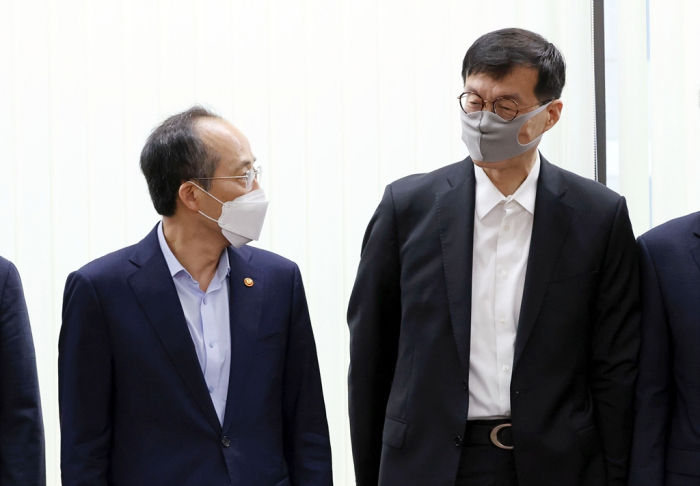Economy
Korea inflation at 24-year high, adds to big step views
BOK may jack up rates by 50 bps next week as June consumer prices rise 6%, the fastest pace since 1998, Fed may hike 75 bps again
By Jul 05, 2022 (Gmt+09:00)
3
Min read
Most Read
LG Chem to sell water filter business to Glenwood PE for $692 million


Kyobo Life poised to buy Japan’s SBI Group-owned savings bank


KT&G eyes overseas M&A after rejecting activist fund's offer


StockX in merger talks with Naver’s online reseller Kream


Mirae Asset to be named Korea Post’s core real estate fund operator



South Korea’s inflation accelerated to a 24-year high last month, reinforcing expectations that the central bank may raise interest rates by 50 basis points for the first time next week amid predictions of further price increases despite concerns of a global recession.
Consumer prices in Asia’s fourth-largest economy grew 6% in June from a year earlier, the largest growth since November 1998 when the country was hit by the Asian financial crisis, government data showed on Tuesday.
Energy prices kept rising with diesel and gasoline prices up 50.7% and 31.4% on-year, respectively. Utility prices also added to inflationary pressure as both electric charges and city gas bills jumped 11%.
The Bank of Korea expected inflation to stay high for the time being, adding to views that price increases have yet to peak.
“It is necessary to be particularly vigilant against the further strengthening of inflationary expectations,” said BOK Deputy Governor Lee Hwan-seok, adding that current inflation trends will continue.
Consumers' inflation expectations for the next 12 months rose to 3.9% from 3.3% the previous month, hitting the highest since April 2012, according to central bank data last week.
The headline inflation data strengthened expectations that the BOK will hike the base interest rate by 50 bps on July 13, for the first time in the central bank's history, analysts said.
WELL JUSTIFIED
“The rate hike is well justified at the moment,” said Kang Seung-won, an analyst at NH Investment & Securities Co. “The government is pressing local banks to lower borrowing costs, which looks like a policy coordination ahead of the BOK’s big step rate hike.”
In May, the central bank already delivered a back-to-back interest rate increase for the first time in 15 years, raising its policy rate to 1.75%, the highest since mid-2019, to curb rampant consumer prices.
The BOK is likely to tighten more aggressively than its usual 25-bp rate hike next week as the US Federal Reserve has signaled the possibility of another 75-bp increase later this month, analysts said.
The US central bank last month ramped up the target federal fund rate by 75 bps to a range between 1.5% and 1.75%.

A further US rate hike would mean South Korea’s interest rate premium over the US will disappear or could soon become a discount.
Any discount, especially if it becomes wider, is likely to further hurt the South Korean won, which has already hit a 13-year low weakening past the psychologically important 1,300 per dollar level for the first time since the 2008-09 global financial crisis. The local unit is the worst-performing emerging Asian currency so far this year with an 8.6% loss against the US currency. The won saw a similar level of depreciation in 2021.
The ailing currency is expected to deteriorate inflationary pressure further as it usually raises import prices. Local foreign exchange authorities sold dollars to support the won and stem inflation.
As a result, the country’s foreign exchange reserves reported the largest decline last month since the global financial crisis. The FX reserves fell by $9.4 billion in June, the largest drop since November 2008, to $438.3 billion at the end of the month, according to the BOK.
The FX reserves already fell short of the International Monetary Fund’s recommendation. The IMF advises a country to keep the FX reserves at about 100-150% of a sum of 5% of annual exports, 5% of M2 money supply, 30% of current foreign debts and 15% of the outstanding balance of foreigners’ securities and other investments.
The ratio of South Korea’s FX reserves is expected to fall further after dropping to 98.94% in 2021, the lowest point since 2000 when it was first compiled.
Some analysts, however, say the BOK may raise interest rates by only 25 bps next week on growing concerns over a global economic recession.
ING Group said on Monday aggressive tightening could hurt a consumption recovery, seeing the possibility of a 25-bp hike on July 13.
Write to Eun Bit Ko and Mi-Hyun Jo at silverlight@hankyung.com
Jongwoo Cheon edited this article.
More to Read
-
 EconomyKorea sees record H1 trade deficit, weak consumer sentiment
EconomyKorea sees record H1 trade deficit, weak consumer sentimentJul 01, 2022 (Gmt+09:00)
5 Min read -
 Central bankKorea won at 13-year low on recession fears amid tightening
Central bankKorea won at 13-year low on recession fears amid tighteningJun 23, 2022 (Gmt+09:00)
4 Min read -
 Central bankBOK may take big-step rate hike on Fed's aggressive tightening
Central bankBOK may take big-step rate hike on Fed's aggressive tighteningJun 16, 2022 (Gmt+09:00)
3 Min read -
 Central bankBOK steps up inflation fight with back-to-back rate hikes
Central bankBOK steps up inflation fight with back-to-back rate hikesMay 26, 2022 (Gmt+09:00)
2 Min read
Comment 0
LOG IN


